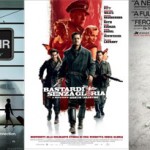Movie Review: Inglourious Basterds

Inglourious Basterds (2009)–****
All of Quentin Tarantino’s films are about cinema, but Inglourious Basterds may be his first to harness cinema’s power to show us cinema’s power. This isn’t just a film about a group of Jewish-American soldiers killing Nazis guerrilla-style. Basterds is a film about movies–and one of the greatest at that. From the casting of superstar Brad Pitt in the lead role to moments where images flicker on the big screen in a theater filled with Nazis, Inglourious Basterds has one great conceit: Cinema can change history.
Told in four chapters, Inglourious Basterds opens with a scene on a French dairy farm that introduces us to Col. Hans Landa (Christoph Waltz), a.k.a “The Jew Hunter.” He’s a fiendish, cartoony Nazi officer who, as his nickname makes clear, is in charge of rounding up all the Jewish people in France. It’s a deadly serious scene, but Tarantino and Waltz are able to get the audience laughing, albeit uncomfortably, just before Landa orders his troops to execute the family hiding beneath the floor boards. Only one young woman escapes.
You’ll find yourself laughing a lot during Inglourious Basterds. When we meet the Basterds, Tarantino’s trademark flair for dialogue is complemented by Brad Pitt’s pitch-perfect comic delivery. Pitt hams it up for the role of Aldo Raine, the American lieutenant nicknamed “Aldo the Apache” thanks to a penchant for scalping Nazis. He’s a hyperbolic American war hero, which makes Pitt’s presence on screen a peculiar, but effective addition to this outrageous WWII film.
The Basterds work with German movie star and British informant Bridget von Hammersmark (Diane Kruger) to infiltrate the premiere of Joseph Goebbels’ (Sylvester Groth) latest propaganda film. One big boom inside the movie house will end the war, killing the entire German high command including the Führer (Martin Wuttke).
Running concurrently to the Basterds’ plan is one hatched by Emmanuelle Mimieux (Mélanie Laurent), the girl whose family was massacred in the opening scene. She’s now the owner of the Paris cinema where the premiere will take place and has enough nitrate film to burn the theater down in minutes with everyone inside.
Both the Basterds and Mimieux’s plots entrench Inglourious Basterds so deeply in the world of cinema that you can’t ignore its presence. While watching this picture, I found myself rarely making comparisons to WWII movies and instead thinking of Cinema Paradiso, a love letter to cinema if there ever was one.
Tarantino’s film, however, isn’t a love letter to cinema. It’s a manifesto. This, he says, is what I can do when I have a camera and the will. And his will triumphs. In what is easily Tarantino’s best film since Pulp Fiction, Inglourious Basterds uses everything from star power to sleek editing (courtesy of the great Sally Menke) to tell a story some would call far-fetched. Astute viewers know differently. It’s a story that reminds us that real life cannot contend with what we see on the screen. Cinema wins, always. The only debatable point is whether cinema it’s used for good or for evil. Here, it’s definitely used for good.
Inglourious Basterds, starring Brad Pitt and directed by Quentin Tarantino, is in theaters now.











I agree, this is right up there with Pulp Fiction. Outrageously funny! The absurd caricatures and silly props (like Hitler’s ridiculous cape and Landa’s enormous pipe) had me in stitches. Yet, Taratino tempers these comical moments with ones full of intensity and suspense. Like the edgy discussion between the Nazi imposters and the German major who calls them out – you know everyone is about to die, but you don’t know how or when. Taratino is great at building up moments like these.
I had the PRIVILEGE of attending the UK premier of Inglorious Basterds! Having seen the trailers i had high hopes but had doubts due to a string of self indulgent films (c’mon lets be honest, self indulgence is his tarantinos middle name)
I was surprised to find though that he had pulled the cat out of the bag with this one. The film is rich with interesting dialogue, Perfect timed comedy with a dash of brutal assassination.
The crowning glory of this film though lies with Christoph Waltz whom no fault or error can be found. He manages to create a real tension in the audience whilst remaining quite “theatrical” (couldn’t think of a better word). He definitely deserved his prize at Cannes